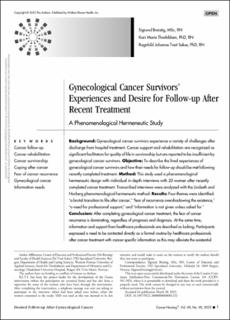| dc.contributor.author | Breistig, Sigrund | |
| dc.contributor.author | Thorkildsen, Kari Marie | |
| dc.contributor.author | Sekse, Ragnhild Johanne Tveit | |
| dc.date.accessioned | 2024-02-09T13:51:31Z | |
| dc.date.available | 2024-02-09T13:51:31Z | |
| dc.date.created | 2023-03-30T23:07:36Z | |
| dc.date.issued | 2023 | |
| dc.identifier.citation | Cancer Nursing. 2023. | en_US |
| dc.identifier.issn | 0162-220X | |
| dc.identifier.uri | https://hdl.handle.net/11250/3116634 | |
| dc.description | This is an open-access article distributed under the terms of the Creative Commons Attribution-Non Commercial-No Derivatives License 4.0 (CCBYNC-ND), where it is permissible to download and share the work provided it is properly cited. The work cannot be changed in any way or used commercially without permission from the journal. | en_US |
| dc.description.abstract | Background: Gynecological cancer survivors experience a variety of challenges after discharge from hospital treatment. Cancer support and rehabilitation are recognized as significant facilitators for quality of life in survivorship but are reported to be insufficient by gynecological cancer survivors.
Objective: To describe the lived experiences of gynecological cancer survivors and how their needs for follow-up should be met following recently completed treatment.
Method: This study used a phenomenological hermeneutic design with individual in-depth interviews with 20 women after recently completed cancer treatment. Transcribed interviews were analyzed with the Lindseth and Norberg phenomenological hermeneutic method.
Results: Four themes were identified: “a brutal transition to life after cancer,” “fear of recurrence overshadowing the existence,” “a need for professional support,” and “information is not given unless asked for.”
Conclusion: After completing gynecological cancer treatment, the fear of cancer recurrence is dominating, regardless of prognosis and diagnosis. At the same time, information and support from healthcare professionals are described as lacking. Participants expressed a need to be contacted directly as a formal routine by healthcare professionals after cancer treatment with cancer-specific information as this may alleviate the existential suffering that the cancer experience brings.
Implications for clinical practice: A person-centered, systematic follow-up rehabilitation is needed as a continuation of the care provided during cancer treatment. Future research is needed to explore the impact on women’s quality of life when gynecologic-specific information is given in advance of hospital discharge after completing treatment | en_US |
| dc.language.iso | eng | en_US |
| dc.publisher | Lippincott Williams & Wilkins | en_US |
| dc.rights | Attribution-NonCommercial-NoDerivatives 4.0 Internasjonal | * |
| dc.rights.uri | http://creativecommons.org/licenses/by-nc-nd/4.0/deed.no | * |
| dc.subject | information needs | en_US |
| dc.subject | gynecological cancer | en_US |
| dc.subject | fear of cancer recurrence | en_US |
| dc.subject | coping after cancer | en_US |
| dc.subject | cancer survivorship | en_US |
| dc.subject | cancer rehabilitation | en_US |
| dc.subject | cancer follow-up | en_US |
| dc.title | Gynecological cancer survivors’ experiences and desire for follow-up after recent treatment: A phenomenological hermeneutic study | en_US |
| dc.type | Peer reviewed | en_US |
| dc.type | Journal article | en_US |
| dc.description.version | publishedVersion | en_US |
| dc.source.pagenumber | 1-9 | en_US |
| dc.source.journal | Cancer Nursing | en_US |
| dc.identifier.doi | 10.1097/NCC.0000000000001252 | |
| dc.identifier.cristin | 2138717 | |
| cristin.ispublished | true | |
| cristin.fulltext | original | |
| cristin.qualitycode | 2 | |

